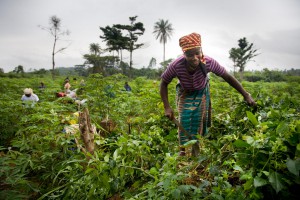Informality and transitions to formality

The number of workers engaged in informal employment has increased in many parts of the world. In many developing countries, workers in the informal economy represent the majority of the labour force. Workers in the informal economy are not covered by labour regulations and lack of access to social security coverage, which make them more exposed to shocks. However, experiences from many countries demonstrated practical ways to extend social protection to workers in the informal economy, and to facilitate their transitions to the formal economy.
Photo credit: “Does financing benefit African women?” by Africa Renewal (CCBY 2.0 via Flickr).
Transition from the Informal to the Formal Economy Recommendation, 2015 (No. 204)
This Recommendation recognizes the lack of protection of workers in the informal economy, and provides guidance for improving their protection and facilitating transitions to the formal economy. It also recognizes that decent work deficits – the denial of rights at work, the absence of sufficient opportunities for quality employment, inadequate social protection and the absence […]
Social Protection Floors Recommendation, 2012 (No. 202)
Recommendation No. 202 is the first international instrument to offer guidance to countries to close social security gaps and progressively achieve universal protection through the establishment and maintenance of comprehensive social security systems. To this aim, the Recommendation calls for (1) the implementation, as a priority, of social protection floors (SPF) as a fundamental element […]
ILO Resource Package on “Extending Social Security to Workers in the Informal Economy”
The ILO policy resource package “Extending social security to workers in the informal economy: Lessons from international experience” serves as a reference for policy makers, workers’ and employers’ organizations and other stakeholders engaged in the development of social protection strategies, or the planning, design, implementation and monitoring of systems and schemes. This practical tool can help in […]
Work-related social protection for informal workers
The informal workforce is growing worldwide, and changes in the global structure of employment and in places of employment mean that work is a source of hazard and ill-health for many poorer workers. Yet informal workers do not have access to work-related social security. They face high work-related risks, but have little or no access […]

